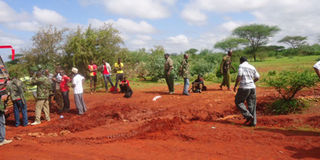In death, as in life, the poor are treated with little dignity

Police patrol Omar Jilo where at least 28 people were killed on November 22, 2014 after Al-Shabaab militants attacked a Nairobi-bound bus in Mandera near the Kenya-Somali border. Al-Shabaab has scored a major, albeit temporary, victory against Kenya. PHOTO | MANASE OTSIALO | NATION MEDIA GROUP
What you need to know:
- Saturday morning’s bus attack in Mandera was the latest reminder that some lives are not nearly as important as others in this country. That nearly 30 people were shot to death at close range by terrorists and the country promptly moved on is unacceptable.
- The families of the teachers, policemen and non-profit organisation employees will grieve without having an opportunity to share their incredible stories with the whole world.
Some people are afforded more dignity than others when they die, and it is heartbreaking when that happens.
The poor die poor, while the rich can die in comfort, with grace and a spectacle of public mourning.
Saturday morning’s bus attack in Mandera was the latest reminder that some lives are not nearly as important as others in this country. That nearly 30 people were shot to death at close range by terrorists and the country promptly moved on is unacceptable.
“Hashtags, billboards, TV ads, military fatigues and selfies haven’t worked,” tweeted Omidyar Network Africa MD Ory Okolloh. “What’s next on the fight terrorism by PR front?”
But I wasn’t worried about the dark art of fighting terrorism via public relations, as the government has already perfected that. All you need to do is watch President Uhuru Kenyatta’s convincing presentation after the Westgate attack, an Obama-esque tough talk from the commander-in-chief promising to catch the bad guys at whatever cost.
RICH PEOPLE KILLED
But everyone made a fuss after Westgate, because rich people died — expatriate types with fancy multinational jobs or well-paying consultancy gigs in Nairobi. The local and international media attention was relentless, bringing up family photos of happier times on holiday, children on bikes and wedding recaps to humanise the dead.
In our eyes, they became human beings like us — with dreams and people who loved them, even some semi-interesting Facebook pages.
I covered the aftermath of the Mpeketoni attack, scrambling to the scene that Monday to report on the victims and survivors. On our first night, another attack occurred about 40 kilometres from the town. We set out for it the next morning but never got there, getting stuck in the swampiest terrain I’ve ever been in.
We abandoned our vehicles and walked nearly 20 kilometres through torturous footpaths and pools of water until we eventually encountered the police party with the bodies from that night’s attack.
They were all stacked in the back of a Land Cruiser, with no body bags like in the movies. An Administration Police truck accompanying them had got stuck and the officers were struggling to get it out of the mud. Nearby sat a pensive woman with her four young children. Her husband was one of the bodies spending the afternoon in the swampy bushes of Kaisare. The bodies did not get to Mpeketoni that day.
The next morning, as we walked by the small hospital’s fence, they were all laid out under a tent — completely naked. They had just arrived. The mortuary was well beyond capacity, and nearly 50 badly damaged bodies were now in full view of anybody going past the hospital.
FREQUENCY OF ATTACKS
The pictures floated online, shared with a witchdoctor’s glee. The frequency of attacks and killings has so desensitised us to death that the shock has been replaced with a voyeuristic appeal for tragedy porn.
In recent weeks alone, pictures of the officers killed in Kapedo have been blowing up WhatsApp groups around the world. Then there are the unforgettable shots of the young man killed by the police in Mombasa, completely soaked in his own blood.
One of the images that has stuck with me from Mandera was a picture of a young Red Cross volunteer transfixed to the spot as he surveys the bodies of the dead lying prostrate on the muddy road. In the background, two uniformed officers are taking pictures on their phones, completely at ease with the scene.
The dead will remain statistics, just another fact authorities will drop in their template speeches about catching those who would do us harm. The families of the teachers, policemen and non-profit organisation employees will grieve without having an opportunity to share their incredible stories with the whole world.
Like the Baragoi massacre victims before them, and the countless other tragedies after that, they are not important enough to have an appeal for funds or any other mass outpouring of grief. Their death will not be a national spectacle; they will go quietly, remembered only in the brief tasteless pictures on social media.
The glorification of important dead people is mostly the media’s fault, as is the under-coverage of poor, dead people. Maybe someday, every death will be worthy of a little more than brief attention, not commodified into a Facebook post and nothing more. Maybe.
Madowo is the technology editor at NTV. Send your feedback to [email protected].





